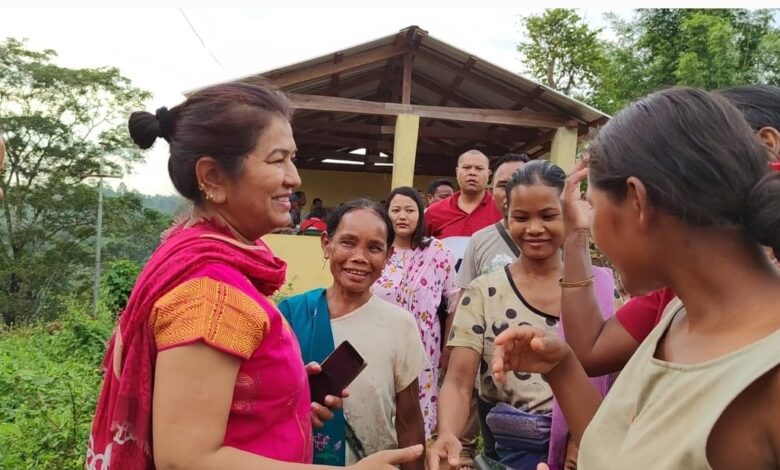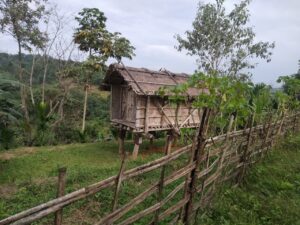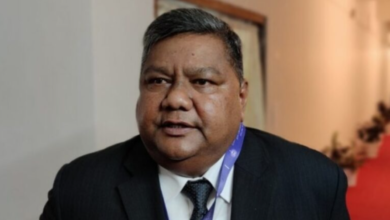
Former deputy chief minister Deborah Marak does not believe that the Congress is a losing force in the state. On the contrary, she is confident that in 2023, the national party, which lost its opposition status last year after 12 of its 21 MLAs shook hands with the All India Trinamool Congress, will bounce back owing to the leaders’ hard work.
Marak, who is Congress’s candidate from Williamnagar in East Garo Hills, has been stationed in her ancestral house for months now, visiting the remotest parts of the constituency. Recently, a group of journalists met her at her office inside her residence. It was a Sunday but her office was already filled with visitors from the nearby villages.
“This is my second round of the campaign (for the 2023 Assembly elections). I have been working with people for the last five years. So, campaigning now is easier,” said Marak after she finished her meeting with the villagers. Some more visitors were waiting outside.
The Congress, she said, is in a position to change the game this time because “all our candidates are working with the people in their respective constituencies”.
Marak was scheduled to visit Samanda Doktilgre, over 20 km from Williamnagar, on the day. It is one of the remotest areas in the district with no amenities like black-topped roads, clinics and school.
Before the start of the campaign, she spoke about the dangers of dynasty politics hinting at both Conrad Sangma and Mukul Sangma. She reiterated that the exodus of the 12 MLAs from the party did not weaken the Congress and “we have been assessing the situation”.
Asked about her prospects, the 58-year-old leader said, “Wherever the leader goes, the voters go, so voters are with me.”
It was almost time for her to leave on the campaign trail and she invited the guests for lunch. “I got local fish from a friend in Assam. There are Garo dishes too. Hope you enjoy,” she said as everyone sat down for lunch.
A frugal eater, Marak said she preferred non-spicy and boiled food as that kept her going at a hectic time. After food, she excused herself for a few minutes and joined the journalists thereafter. By then, she had changed into a traditional Garo dress. “I think we should start now as the village is quite far and we have to travel through a kuccha road,” she said and asked the journalists to follow her car.
The highway took a turn to connect with a dirt road that meandered through fields and forests and suddenly ended in a stream. The vehicles made a moaning sound as they struggled to cross the rivulet to take the steep kuccha road, strewn with Me’gong flowers, leading to the village that was preparing for the leader’s visit.
As Marak’s car entered the village, people came out to greet her. As the smiling candidate reciprocated, the meeting place, a small shed was ready for the political campaign. A few women were busy preparing tea outside the dilapidated SSA school. A group of children playing near the school stopped their game to have a good look at the cars and the people inside.
A crowd has started forming in and outside the village meeting hall that could accommodate less than 30 people.
“There are 24 seats in Garo Hills. I wish the Congress to win all the seats but it is not possible. We have our target. We have our minimum and maximum targets, and accordingly, we are working,” Marak said before the meeting.
 The stage was set for the leader to speak. Marak started her speech in Garo and as she welcomed the electorate, she asked them about the problems in the village and interacted with the women who had gathered in large numbers.
The stage was set for the leader to speak. Marak started her speech in Garo and as she welcomed the electorate, she asked them about the problems in the village and interacted with the women who had gathered in large numbers.
Samanda has about 20 households and most of the men worked as daily wage earners. Some of them have land where they grew rubber, betel leaves and vegetables. Barring one, all houses are made of cane sheets, bamboo and CGI roofs. Signs of poverty and under-development were everywhere.
The village with a few residents does not have many voters but the candidate wants to ensure that a single vote is wasted. “Beyond the votes, the villagers are dear to me,” Marak said, adding that there she had to visit another small village nearby with equally difficult terrain.
When asked, a few villagers said political leaders barely visit their village, and even the sitting MLA, Marcuise Marak had not visited Samanda Doktilgre. So, they gathered on the day to meet the Congress leader and tell her their grievances.
Dynasty politics
Marak rued the practice of dynasty politics in Garo Hills as “this will lead to maximum seats being taken away by the families of both Conrad and Mukul”.
“I never endorse dynasty politics. We should give chance to the younger generation. Those who are dynamic and those who know the work should be elected. This time, many educated youths will be our candidates. We will put candidates in all the 60 seats,” she said.
Regarding the poll prospect in Khasi-Jaintia Hills, Marak said, “In Khasi-Jaintia Hills, our president (Vincent Pala) is contesting, and it will be a good motivation. There will be a good fight there.”
This time, UDP is going solo and is showing good prospects in Khasi-Jaintia Hills. The Trinamool Congress, a new entrant in Meghalayan politics, is targeting maximum seats in Garo Hills where the non-tribal population is more in the constituencies close to the Assam border.
After completing the brief campaign, Marak said, “There are only 20 households and they are all rubber growers and want help. I am ready to help them irrespective of who is their representative. They assured me that they will support the Congress and I conveyed to them my assistance.”
The sun was already lazing and Marak had to complete her visits before it got dark. “I have to cover one more village. See you later,” she said as she bid goodbye to all.
~ Team Meghalaya Monitor
Photos by MM





